Entrepreneurship: Ventures, Economy, Skills, and Background Analysis
VerifiedAdded on 2021/02/20
|16
|4483
|46
Report
AI Summary
This report delves into the realm of entrepreneurship and small business management, commencing with an introduction that defines entrepreneurship and highlights the significance of small and micro businesses in the UK. The report explores various entrepreneurial ventures, including public, private, social, survival, and managed growth ventures, detailing their typologies and comparing their characteristics. It analyzes the impact of micro and small businesses on the UK economy, providing statistical data on employment, revenue generation, and growth rates. Furthermore, the report examines the importance of small businesses in fostering social economy, emphasizing their role in employment generation, meeting social purposes, and driving local/regional development. The report concludes by discussing the skills, background, and experiences of successful entrepreneurs, providing a comprehensive understanding of the entrepreneurial landscape.

ENTREPRENEURSHIP AND SMALL
BUSINESS MANAGEMENT
BUSINESS MANAGEMENT
Paraphrase This Document
Need a fresh take? Get an instant paraphrase of this document with our AI Paraphraser
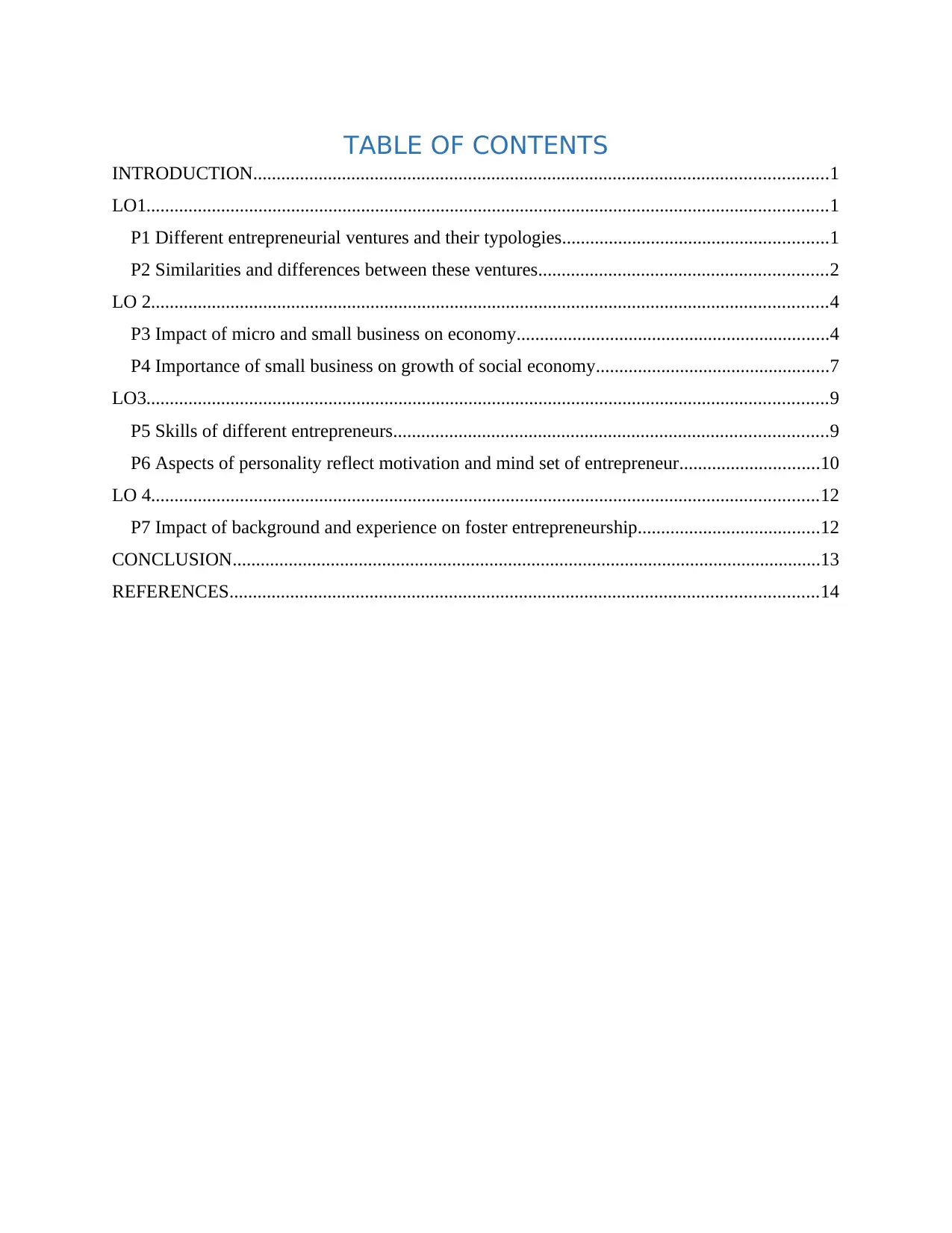
TABLE OF CONTENTS
INTRODUCTION...........................................................................................................................1
LO1..................................................................................................................................................1
P1 Different entrepreneurial ventures and their typologies.........................................................1
P2 Similarities and differences between these ventures..............................................................2
LO 2.................................................................................................................................................4
P3 Impact of micro and small business on economy...................................................................4
P4 Importance of small business on growth of social economy..................................................7
LO3..................................................................................................................................................9
P5 Skills of different entrepreneurs.............................................................................................9
P6 Aspects of personality reflect motivation and mind set of entrepreneur..............................10
LO 4...............................................................................................................................................12
P7 Impact of background and experience on foster entrepreneurship.......................................12
CONCLUSION..............................................................................................................................13
REFERENCES..............................................................................................................................14
INTRODUCTION...........................................................................................................................1
LO1..................................................................................................................................................1
P1 Different entrepreneurial ventures and their typologies.........................................................1
P2 Similarities and differences between these ventures..............................................................2
LO 2.................................................................................................................................................4
P3 Impact of micro and small business on economy...................................................................4
P4 Importance of small business on growth of social economy..................................................7
LO3..................................................................................................................................................9
P5 Skills of different entrepreneurs.............................................................................................9
P6 Aspects of personality reflect motivation and mind set of entrepreneur..............................10
LO 4...............................................................................................................................................12
P7 Impact of background and experience on foster entrepreneurship.......................................12
CONCLUSION..............................................................................................................................13
REFERENCES..............................................................................................................................14
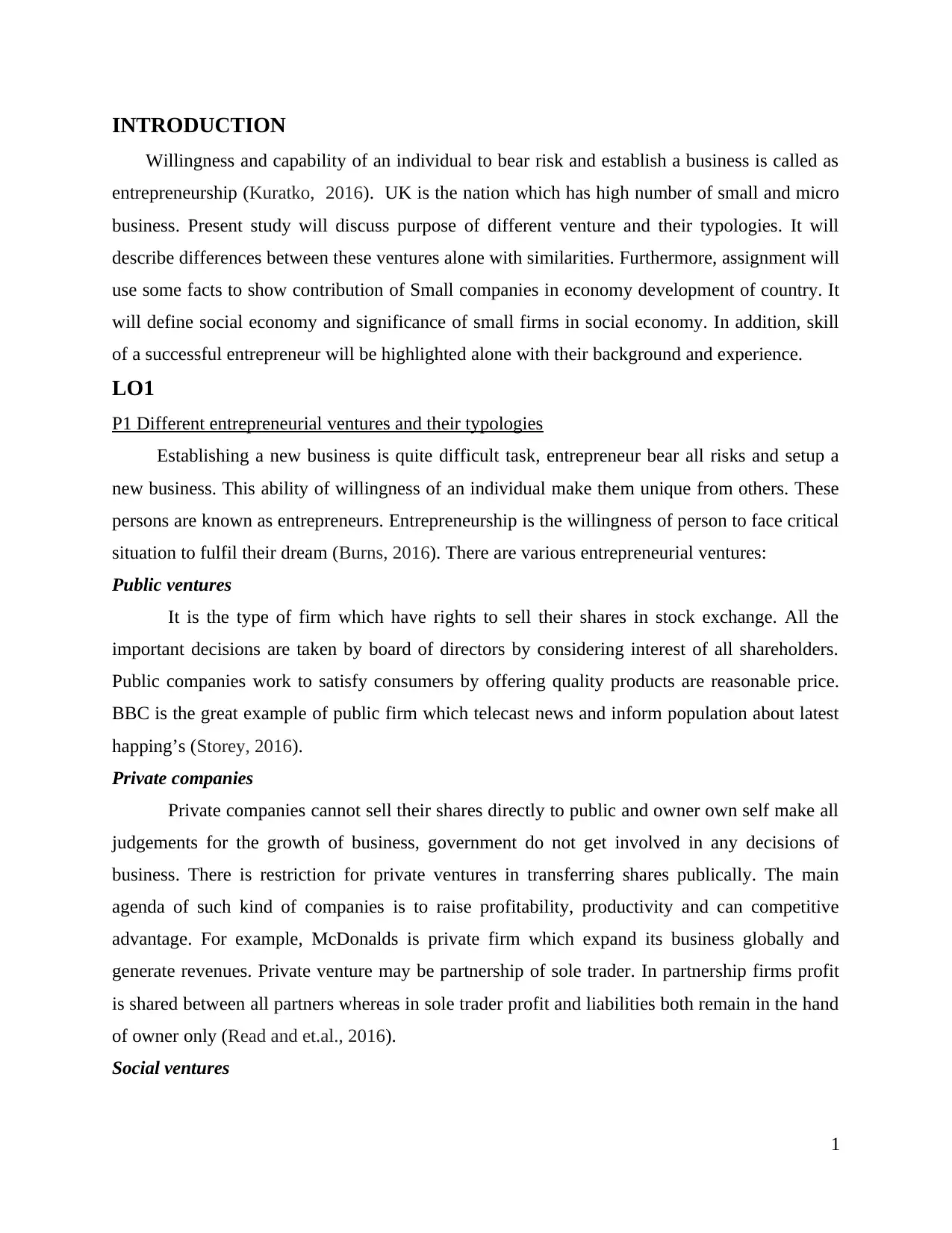
INTRODUCTION
Willingness and capability of an individual to bear risk and establish a business is called as
entrepreneurship (Kuratko, 2016). UK is the nation which has high number of small and micro
business. Present study will discuss purpose of different venture and their typologies. It will
describe differences between these ventures alone with similarities. Furthermore, assignment will
use some facts to show contribution of Small companies in economy development of country. It
will define social economy and significance of small firms in social economy. In addition, skill
of a successful entrepreneur will be highlighted alone with their background and experience.
LO1
P1 Different entrepreneurial ventures and their typologies
Establishing a new business is quite difficult task, entrepreneur bear all risks and setup a
new business. This ability of willingness of an individual make them unique from others. These
persons are known as entrepreneurs. Entrepreneurship is the willingness of person to face critical
situation to fulfil their dream (Burns, 2016). There are various entrepreneurial ventures:
Public ventures
It is the type of firm which have rights to sell their shares in stock exchange. All the
important decisions are taken by board of directors by considering interest of all shareholders.
Public companies work to satisfy consumers by offering quality products are reasonable price.
BBC is the great example of public firm which telecast news and inform population about latest
happing’s (Storey, 2016).
Private companies
Private companies cannot sell their shares directly to public and owner own self make all
judgements for the growth of business, government do not get involved in any decisions of
business. There is restriction for private ventures in transferring shares publically. The main
agenda of such kind of companies is to raise profitability, productivity and can competitive
advantage. For example, McDonalds is private firm which expand its business globally and
generate revenues. Private venture may be partnership of sole trader. In partnership firms profit
is shared between all partners whereas in sole trader profit and liabilities both remain in the hand
of owner only (Read and et.al., 2016).
Social ventures
1
Willingness and capability of an individual to bear risk and establish a business is called as
entrepreneurship (Kuratko, 2016). UK is the nation which has high number of small and micro
business. Present study will discuss purpose of different venture and their typologies. It will
describe differences between these ventures alone with similarities. Furthermore, assignment will
use some facts to show contribution of Small companies in economy development of country. It
will define social economy and significance of small firms in social economy. In addition, skill
of a successful entrepreneur will be highlighted alone with their background and experience.
LO1
P1 Different entrepreneurial ventures and their typologies
Establishing a new business is quite difficult task, entrepreneur bear all risks and setup a
new business. This ability of willingness of an individual make them unique from others. These
persons are known as entrepreneurs. Entrepreneurship is the willingness of person to face critical
situation to fulfil their dream (Burns, 2016). There are various entrepreneurial ventures:
Public ventures
It is the type of firm which have rights to sell their shares in stock exchange. All the
important decisions are taken by board of directors by considering interest of all shareholders.
Public companies work to satisfy consumers by offering quality products are reasonable price.
BBC is the great example of public firm which telecast news and inform population about latest
happing’s (Storey, 2016).
Private companies
Private companies cannot sell their shares directly to public and owner own self make all
judgements for the growth of business, government do not get involved in any decisions of
business. There is restriction for private ventures in transferring shares publically. The main
agenda of such kind of companies is to raise profitability, productivity and can competitive
advantage. For example, McDonalds is private firm which expand its business globally and
generate revenues. Private venture may be partnership of sole trader. In partnership firms profit
is shared between all partners whereas in sole trader profit and liabilities both remain in the hand
of owner only (Read and et.al., 2016).
Social ventures
1
⊘ This is a preview!⊘
Do you want full access?
Subscribe today to unlock all pages.

Trusted by 1+ million students worldwide
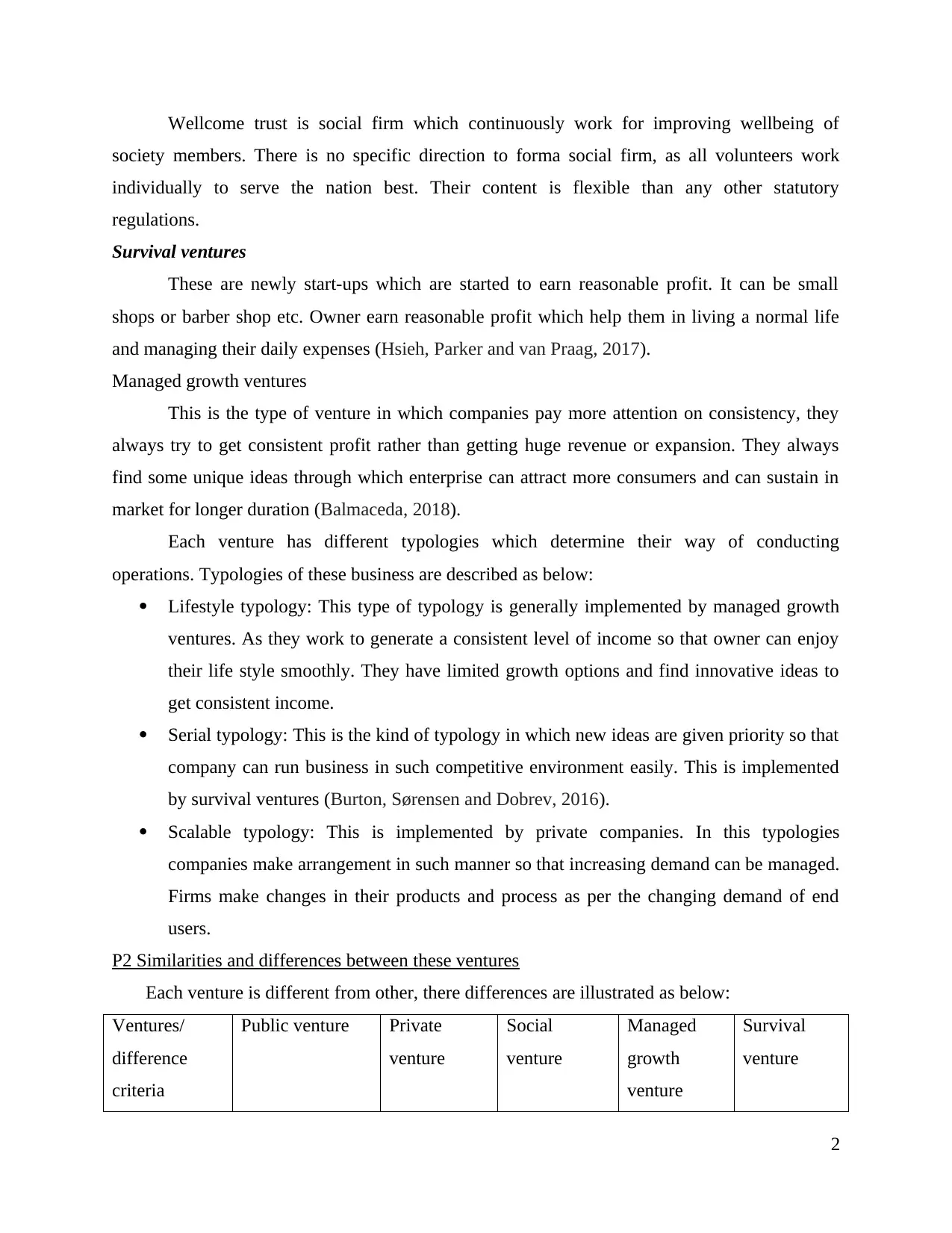
Wellcome trust is social firm which continuously work for improving wellbeing of
society members. There is no specific direction to forma social firm, as all volunteers work
individually to serve the nation best. Their content is flexible than any other statutory
regulations.
Survival ventures
These are newly start-ups which are started to earn reasonable profit. It can be small
shops or barber shop etc. Owner earn reasonable profit which help them in living a normal life
and managing their daily expenses (Hsieh, Parker and van Praag, 2017).
Managed growth ventures
This is the type of venture in which companies pay more attention on consistency, they
always try to get consistent profit rather than getting huge revenue or expansion. They always
find some unique ideas through which enterprise can attract more consumers and can sustain in
market for longer duration (Balmaceda, 2018).
Each venture has different typologies which determine their way of conducting
operations. Typologies of these business are described as below:
Lifestyle typology: This type of typology is generally implemented by managed growth
ventures. As they work to generate a consistent level of income so that owner can enjoy
their life style smoothly. They have limited growth options and find innovative ideas to
get consistent income.
Serial typology: This is the kind of typology in which new ideas are given priority so that
company can run business in such competitive environment easily. This is implemented
by survival ventures (Burton, Sørensen and Dobrev, 2016).
Scalable typology: This is implemented by private companies. In this typologies
companies make arrangement in such manner so that increasing demand can be managed.
Firms make changes in their products and process as per the changing demand of end
users.
P2 Similarities and differences between these ventures
Each venture is different from other, there differences are illustrated as below:
Ventures/
difference
criteria
Public venture Private
venture
Social
venture
Managed
growth
venture
Survival
venture
2
society members. There is no specific direction to forma social firm, as all volunteers work
individually to serve the nation best. Their content is flexible than any other statutory
regulations.
Survival ventures
These are newly start-ups which are started to earn reasonable profit. It can be small
shops or barber shop etc. Owner earn reasonable profit which help them in living a normal life
and managing their daily expenses (Hsieh, Parker and van Praag, 2017).
Managed growth ventures
This is the type of venture in which companies pay more attention on consistency, they
always try to get consistent profit rather than getting huge revenue or expansion. They always
find some unique ideas through which enterprise can attract more consumers and can sustain in
market for longer duration (Balmaceda, 2018).
Each venture has different typologies which determine their way of conducting
operations. Typologies of these business are described as below:
Lifestyle typology: This type of typology is generally implemented by managed growth
ventures. As they work to generate a consistent level of income so that owner can enjoy
their life style smoothly. They have limited growth options and find innovative ideas to
get consistent income.
Serial typology: This is the kind of typology in which new ideas are given priority so that
company can run business in such competitive environment easily. This is implemented
by survival ventures (Burton, Sørensen and Dobrev, 2016).
Scalable typology: This is implemented by private companies. In this typologies
companies make arrangement in such manner so that increasing demand can be managed.
Firms make changes in their products and process as per the changing demand of end
users.
P2 Similarities and differences between these ventures
Each venture is different from other, there differences are illustrated as below:
Ventures/
difference
criteria
Public venture Private
venture
Social
venture
Managed
growth
venture
Survival
venture
2
Paraphrase This Document
Need a fresh take? Get an instant paraphrase of this document with our AI Paraphraser
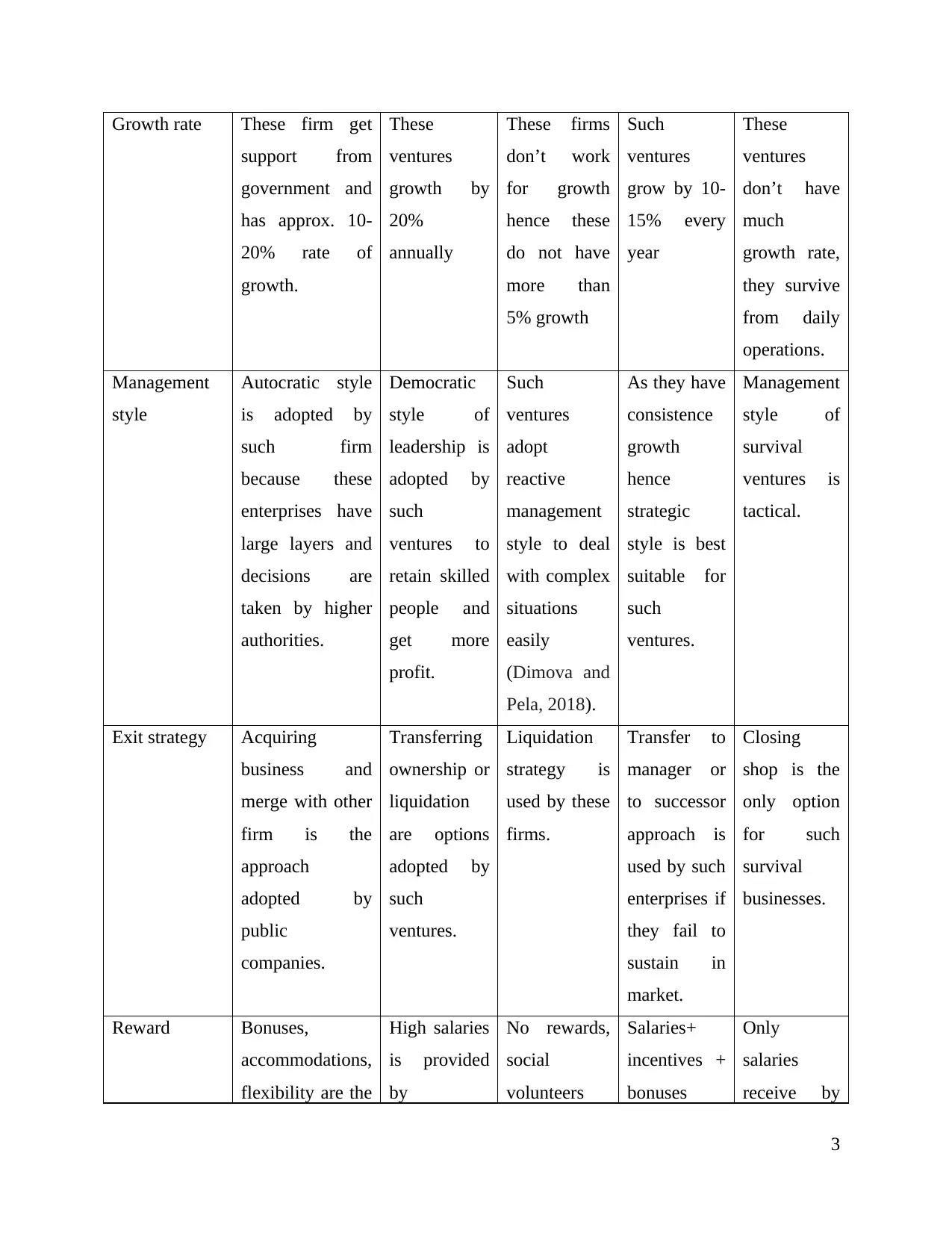
Growth rate These firm get
support from
government and
has approx. 10-
20% rate of
growth.
These
ventures
growth by
20%
annually
These firms
don’t work
for growth
hence these
do not have
more than
5% growth
Such
ventures
grow by 10-
15% every
year
These
ventures
don’t have
much
growth rate,
they survive
from daily
operations.
Management
style
Autocratic style
is adopted by
such firm
because these
enterprises have
large layers and
decisions are
taken by higher
authorities.
Democratic
style of
leadership is
adopted by
such
ventures to
retain skilled
people and
get more
profit.
Such
ventures
adopt
reactive
management
style to deal
with complex
situations
easily
(Dimova and
Pela, 2018).
As they have
consistence
growth
hence
strategic
style is best
suitable for
such
ventures.
Management
style of
survival
ventures is
tactical.
Exit strategy Acquiring
business and
merge with other
firm is the
approach
adopted by
public
companies.
Transferring
ownership or
liquidation
are options
adopted by
such
ventures.
Liquidation
strategy is
used by these
firms.
Transfer to
manager or
to successor
approach is
used by such
enterprises if
they fail to
sustain in
market.
Closing
shop is the
only option
for such
survival
businesses.
Reward Bonuses,
accommodations,
flexibility are the
High salaries
is provided
by
No rewards,
social
volunteers
Salaries+
incentives +
bonuses
Only
salaries
receive by
3
support from
government and
has approx. 10-
20% rate of
growth.
These
ventures
growth by
20%
annually
These firms
don’t work
for growth
hence these
do not have
more than
5% growth
Such
ventures
grow by 10-
15% every
year
These
ventures
don’t have
much
growth rate,
they survive
from daily
operations.
Management
style
Autocratic style
is adopted by
such firm
because these
enterprises have
large layers and
decisions are
taken by higher
authorities.
Democratic
style of
leadership is
adopted by
such
ventures to
retain skilled
people and
get more
profit.
Such
ventures
adopt
reactive
management
style to deal
with complex
situations
easily
(Dimova and
Pela, 2018).
As they have
consistence
growth
hence
strategic
style is best
suitable for
such
ventures.
Management
style of
survival
ventures is
tactical.
Exit strategy Acquiring
business and
merge with other
firm is the
approach
adopted by
public
companies.
Transferring
ownership or
liquidation
are options
adopted by
such
ventures.
Liquidation
strategy is
used by these
firms.
Transfer to
manager or
to successor
approach is
used by such
enterprises if
they fail to
sustain in
market.
Closing
shop is the
only option
for such
survival
businesses.
Reward Bonuses,
accommodations,
flexibility are the
High salaries
is provided
by
No rewards,
social
volunteers
Salaries+
incentives +
bonuses
Only
salaries
receive by
3
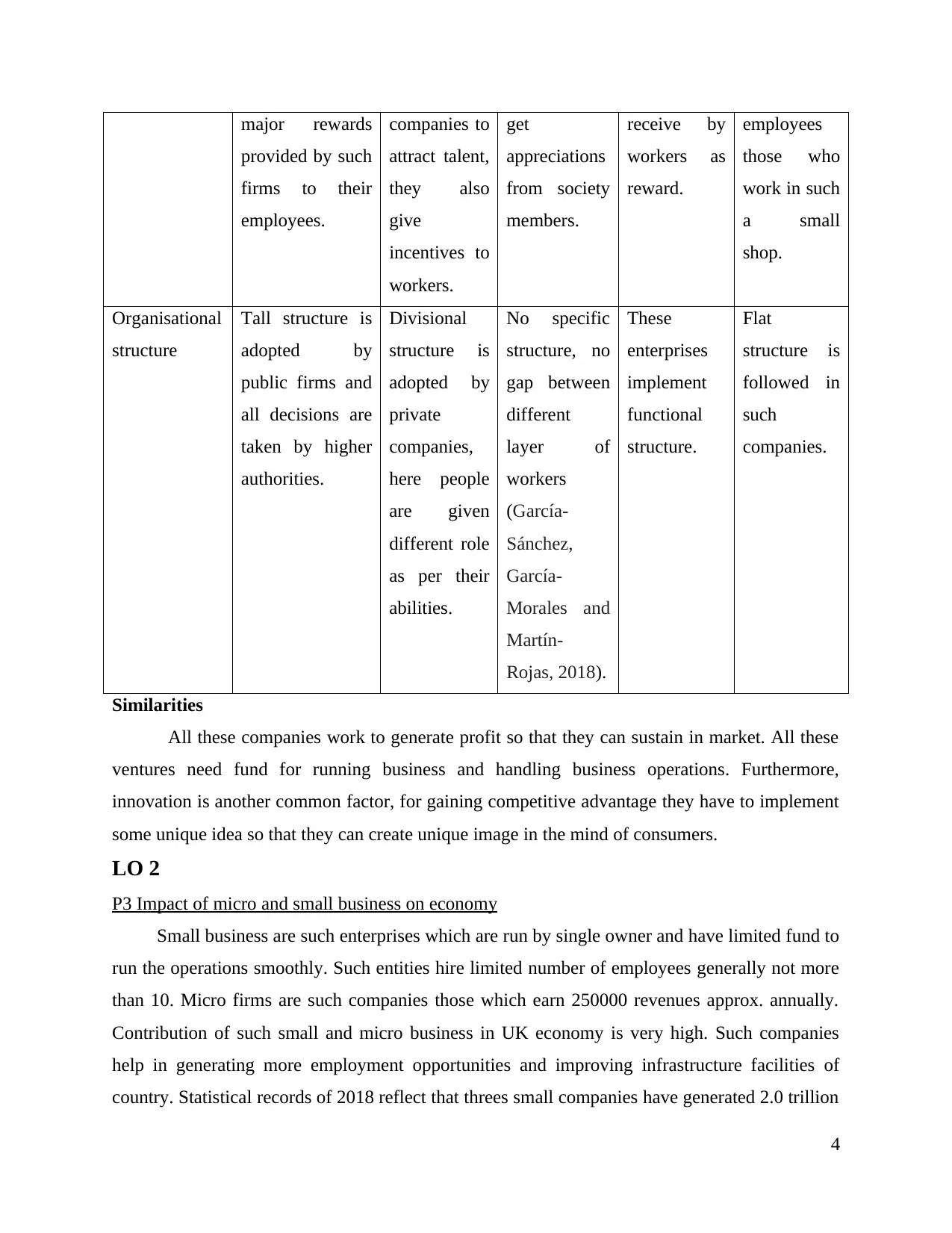
major rewards
provided by such
firms to their
employees.
companies to
attract talent,
they also
give
incentives to
workers.
get
appreciations
from society
members.
receive by
workers as
reward.
employees
those who
work in such
a small
shop.
Organisational
structure
Tall structure is
adopted by
public firms and
all decisions are
taken by higher
authorities.
Divisional
structure is
adopted by
private
companies,
here people
are given
different role
as per their
abilities.
No specific
structure, no
gap between
different
layer of
workers
(García-
Sánchez,
García-
Morales and
Martín-
Rojas, 2018).
These
enterprises
implement
functional
structure.
Flat
structure is
followed in
such
companies.
Similarities
All these companies work to generate profit so that they can sustain in market. All these
ventures need fund for running business and handling business operations. Furthermore,
innovation is another common factor, for gaining competitive advantage they have to implement
some unique idea so that they can create unique image in the mind of consumers.
LO 2
P3 Impact of micro and small business on economy
Small business are such enterprises which are run by single owner and have limited fund to
run the operations smoothly. Such entities hire limited number of employees generally not more
than 10. Micro firms are such companies those which earn 250000 revenues approx. annually.
Contribution of such small and micro business in UK economy is very high. Such companies
help in generating more employment opportunities and improving infrastructure facilities of
country. Statistical records of 2018 reflect that threes small companies have generated 2.0 trillion
4
provided by such
firms to their
employees.
companies to
attract talent,
they also
give
incentives to
workers.
get
appreciations
from society
members.
receive by
workers as
reward.
employees
those who
work in such
a small
shop.
Organisational
structure
Tall structure is
adopted by
public firms and
all decisions are
taken by higher
authorities.
Divisional
structure is
adopted by
private
companies,
here people
are given
different role
as per their
abilities.
No specific
structure, no
gap between
different
layer of
workers
(García-
Sánchez,
García-
Morales and
Martín-
Rojas, 2018).
These
enterprises
implement
functional
structure.
Flat
structure is
followed in
such
companies.
Similarities
All these companies work to generate profit so that they can sustain in market. All these
ventures need fund for running business and handling business operations. Furthermore,
innovation is another common factor, for gaining competitive advantage they have to implement
some unique idea so that they can create unique image in the mind of consumers.
LO 2
P3 Impact of micro and small business on economy
Small business are such enterprises which are run by single owner and have limited fund to
run the operations smoothly. Such entities hire limited number of employees generally not more
than 10. Micro firms are such companies those which earn 250000 revenues approx. annually.
Contribution of such small and micro business in UK economy is very high. Such companies
help in generating more employment opportunities and improving infrastructure facilities of
country. Statistical records of 2018 reflect that threes small companies have generated 2.0 trillion
4
⊘ This is a preview!⊘
Do you want full access?
Subscribe today to unlock all pages.

Trusted by 1+ million students worldwide
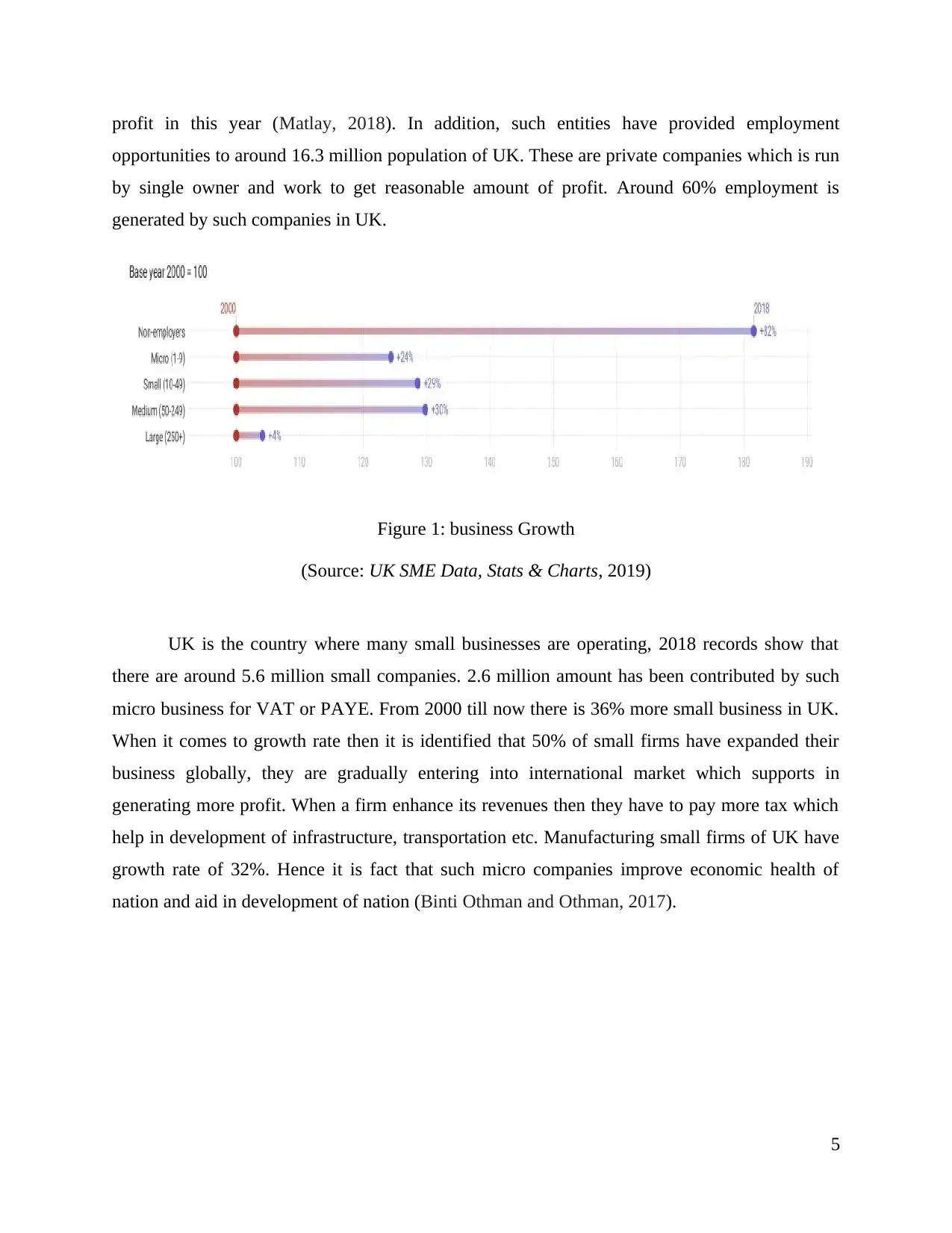
profit in this year (Matlay, 2018). In addition, such entities have provided employment
opportunities to around 16.3 million population of UK. These are private companies which is run
by single owner and work to get reasonable amount of profit. Around 60% employment is
generated by such companies in UK.
Figure 1: business Growth
(Source: UK SME Data, Stats & Charts, 2019)
UK is the country where many small businesses are operating, 2018 records show that
there are around 5.6 million small companies. 2.6 million amount has been contributed by such
micro business for VAT or PAYE. From 2000 till now there is 36% more small business in UK.
When it comes to growth rate then it is identified that 50% of small firms have expanded their
business globally, they are gradually entering into international market which supports in
generating more profit. When a firm enhance its revenues then they have to pay more tax which
help in development of infrastructure, transportation etc. Manufacturing small firms of UK have
growth rate of 32%. Hence it is fact that such micro companies improve economic health of
nation and aid in development of nation (Binti Othman and Othman, 2017).
5
opportunities to around 16.3 million population of UK. These are private companies which is run
by single owner and work to get reasonable amount of profit. Around 60% employment is
generated by such companies in UK.
Figure 1: business Growth
(Source: UK SME Data, Stats & Charts, 2019)
UK is the country where many small businesses are operating, 2018 records show that
there are around 5.6 million small companies. 2.6 million amount has been contributed by such
micro business for VAT or PAYE. From 2000 till now there is 36% more small business in UK.
When it comes to growth rate then it is identified that 50% of small firms have expanded their
business globally, they are gradually entering into international market which supports in
generating more profit. When a firm enhance its revenues then they have to pay more tax which
help in development of infrastructure, transportation etc. Manufacturing small firms of UK have
growth rate of 32%. Hence it is fact that such micro companies improve economic health of
nation and aid in development of nation (Binti Othman and Othman, 2017).
5
Paraphrase This Document
Need a fresh take? Get an instant paraphrase of this document with our AI Paraphraser
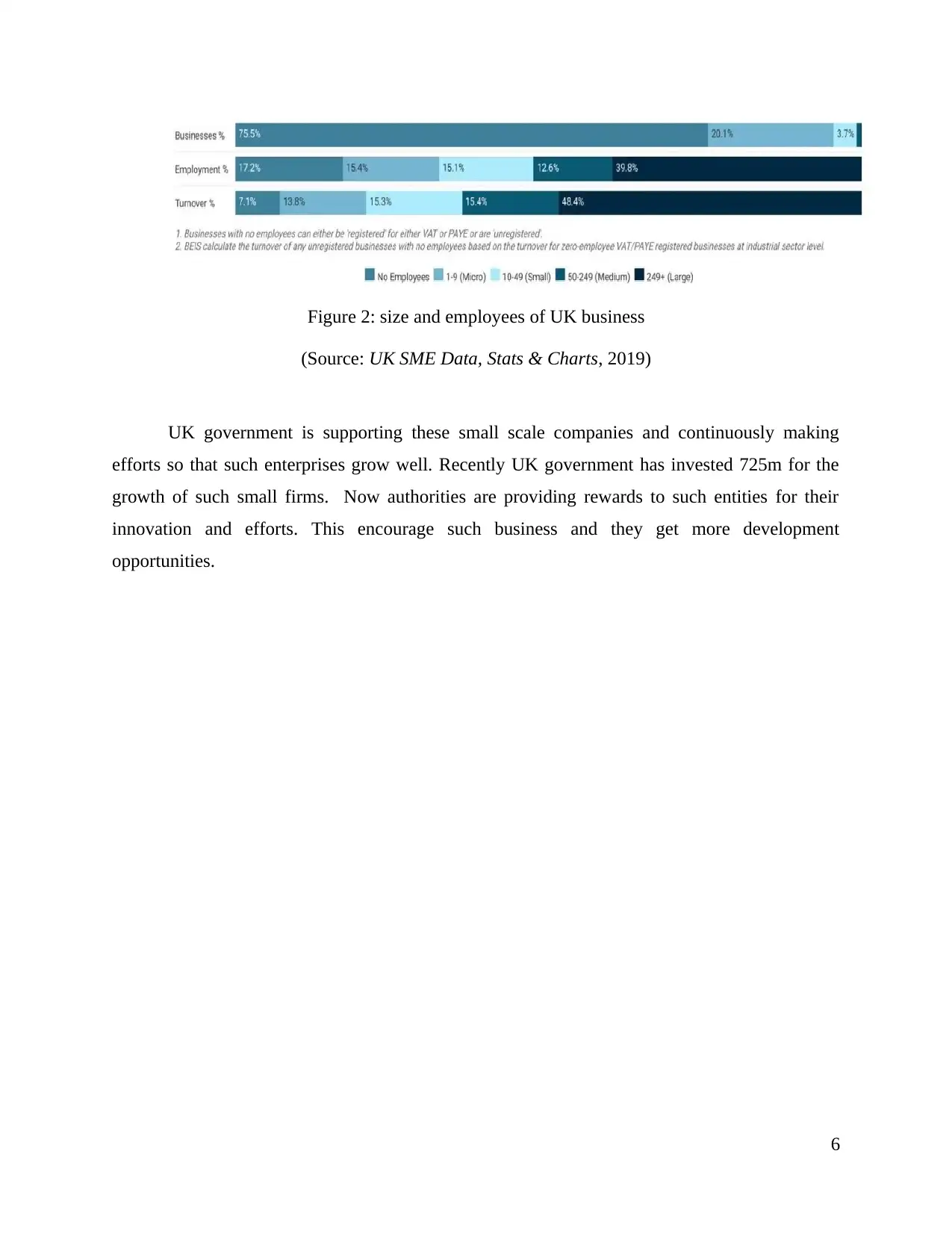
Figure 2: size and employees of UK business
(Source: UK SME Data, Stats & Charts, 2019)
UK government is supporting these small scale companies and continuously making
efforts so that such enterprises grow well. Recently UK government has invested 725m for the
growth of such small firms. Now authorities are providing rewards to such entities for their
innovation and efforts. This encourage such business and they get more development
opportunities.
6
(Source: UK SME Data, Stats & Charts, 2019)
UK government is supporting these small scale companies and continuously making
efforts so that such enterprises grow well. Recently UK government has invested 725m for the
growth of such small firms. Now authorities are providing rewards to such entities for their
innovation and efforts. This encourage such business and they get more development
opportunities.
6
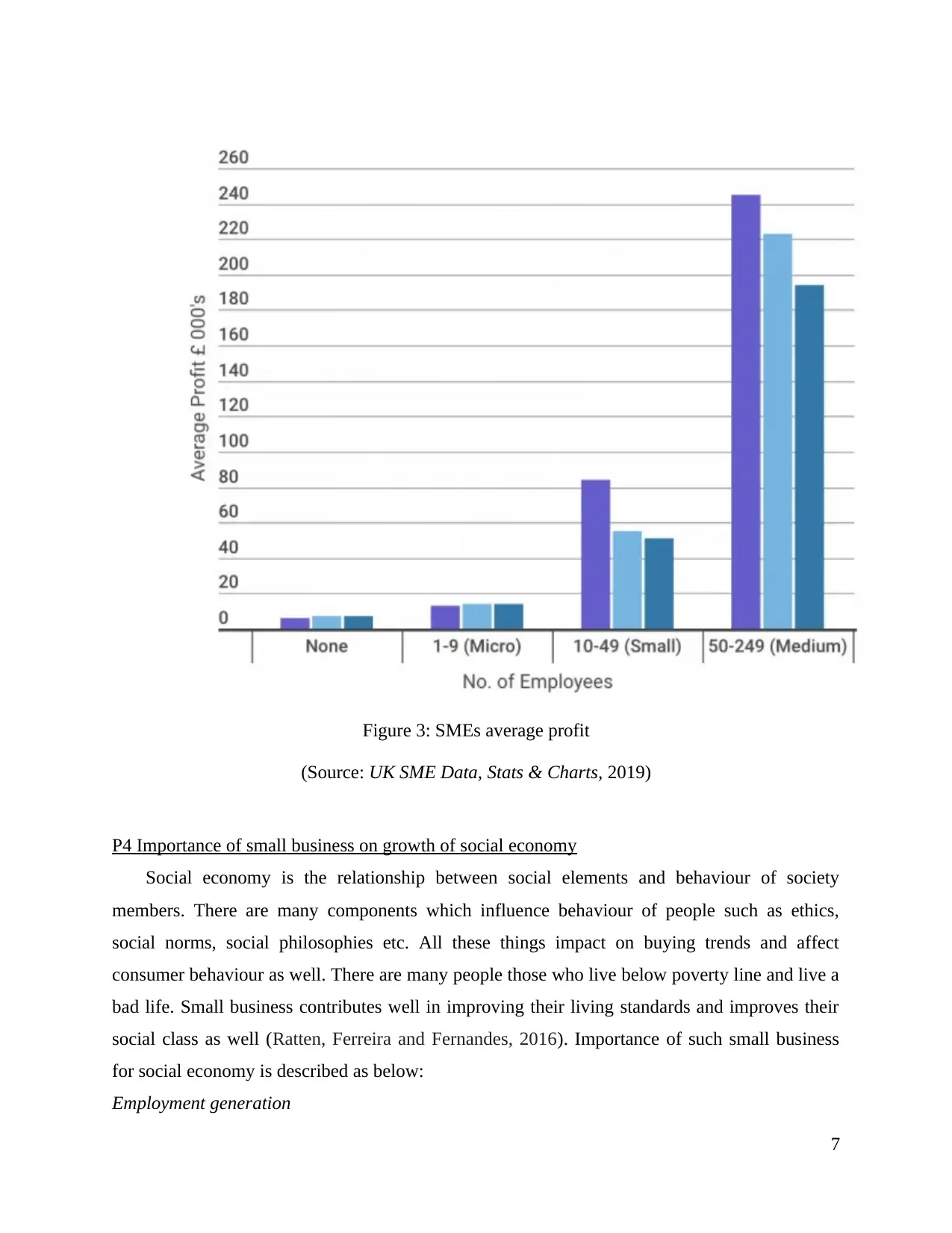
Figure 3: SMEs average profit
(Source: UK SME Data, Stats & Charts, 2019)
P4 Importance of small business on growth of social economy
Social economy is the relationship between social elements and behaviour of society
members. There are many components which influence behaviour of people such as ethics,
social norms, social philosophies etc. All these things impact on buying trends and affect
consumer behaviour as well. There are many people those who live below poverty line and live a
bad life. Small business contributes well in improving their living standards and improves their
social class as well (Ratten, Ferreira and Fernandes, 2016). Importance of such small business
for social economy is described as below:
Employment generation
7
(Source: UK SME Data, Stats & Charts, 2019)
P4 Importance of small business on growth of social economy
Social economy is the relationship between social elements and behaviour of society
members. There are many components which influence behaviour of people such as ethics,
social norms, social philosophies etc. All these things impact on buying trends and affect
consumer behaviour as well. There are many people those who live below poverty line and live a
bad life. Small business contributes well in improving their living standards and improves their
social class as well (Ratten, Ferreira and Fernandes, 2016). Importance of such small business
for social economy is described as below:
Employment generation
7
⊘ This is a preview!⊘
Do you want full access?
Subscribe today to unlock all pages.

Trusted by 1+ million students worldwide
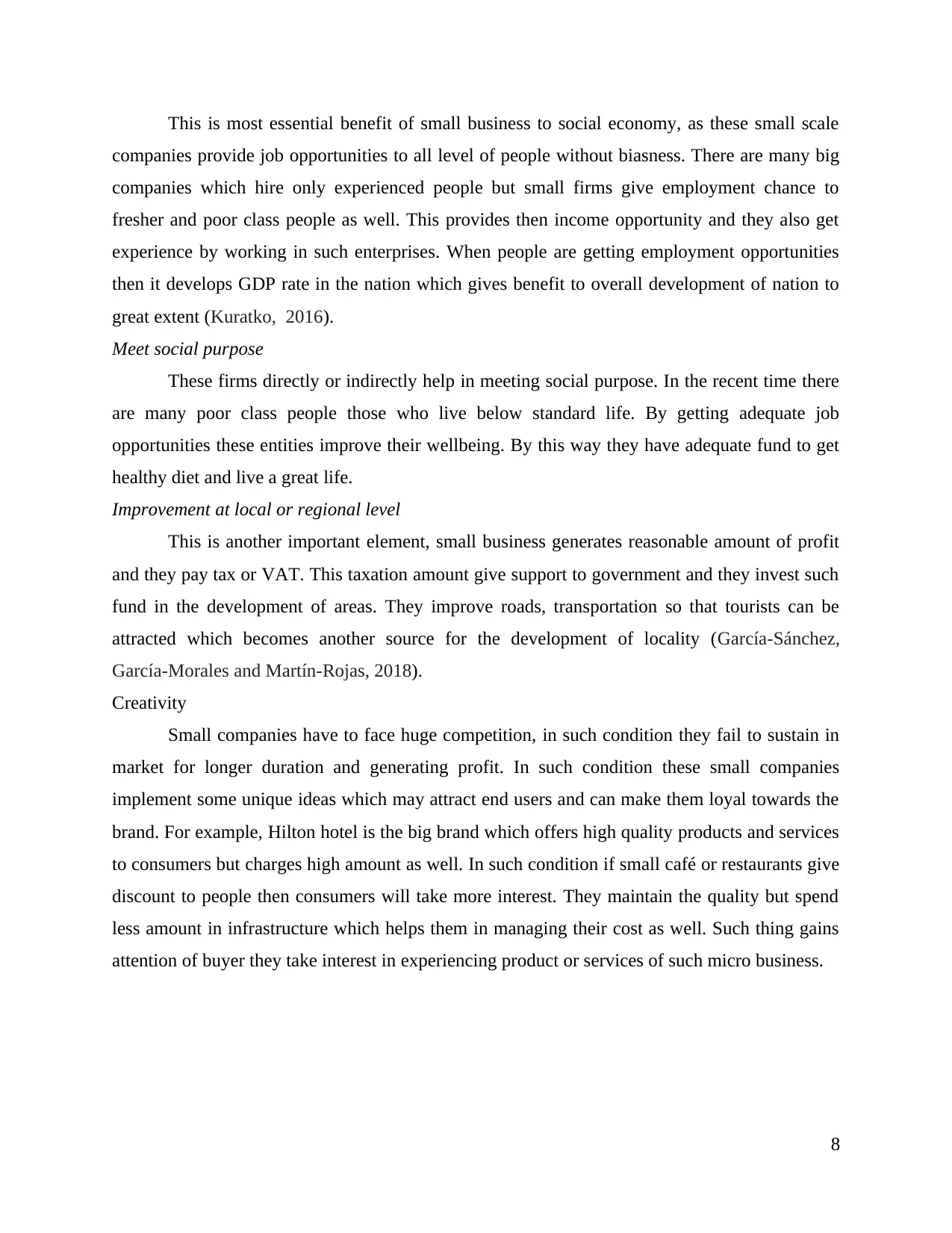
This is most essential benefit of small business to social economy, as these small scale
companies provide job opportunities to all level of people without biasness. There are many big
companies which hire only experienced people but small firms give employment chance to
fresher and poor class people as well. This provides then income opportunity and they also get
experience by working in such enterprises. When people are getting employment opportunities
then it develops GDP rate in the nation which gives benefit to overall development of nation to
great extent (Kuratko, 2016).
Meet social purpose
These firms directly or indirectly help in meeting social purpose. In the recent time there
are many poor class people those who live below standard life. By getting adequate job
opportunities these entities improve their wellbeing. By this way they have adequate fund to get
healthy diet and live a great life.
Improvement at local or regional level
This is another important element, small business generates reasonable amount of profit
and they pay tax or VAT. This taxation amount give support to government and they invest such
fund in the development of areas. They improve roads, transportation so that tourists can be
attracted which becomes another source for the development of locality (García-Sánchez,
García-Morales and Martín-Rojas, 2018).
Creativity
Small companies have to face huge competition, in such condition they fail to sustain in
market for longer duration and generating profit. In such condition these small companies
implement some unique ideas which may attract end users and can make them loyal towards the
brand. For example, Hilton hotel is the big brand which offers high quality products and services
to consumers but charges high amount as well. In such condition if small café or restaurants give
discount to people then consumers will take more interest. They maintain the quality but spend
less amount in infrastructure which helps them in managing their cost as well. Such thing gains
attention of buyer they take interest in experiencing product or services of such micro business.
8
companies provide job opportunities to all level of people without biasness. There are many big
companies which hire only experienced people but small firms give employment chance to
fresher and poor class people as well. This provides then income opportunity and they also get
experience by working in such enterprises. When people are getting employment opportunities
then it develops GDP rate in the nation which gives benefit to overall development of nation to
great extent (Kuratko, 2016).
Meet social purpose
These firms directly or indirectly help in meeting social purpose. In the recent time there
are many poor class people those who live below standard life. By getting adequate job
opportunities these entities improve their wellbeing. By this way they have adequate fund to get
healthy diet and live a great life.
Improvement at local or regional level
This is another important element, small business generates reasonable amount of profit
and they pay tax or VAT. This taxation amount give support to government and they invest such
fund in the development of areas. They improve roads, transportation so that tourists can be
attracted which becomes another source for the development of locality (García-Sánchez,
García-Morales and Martín-Rojas, 2018).
Creativity
Small companies have to face huge competition, in such condition they fail to sustain in
market for longer duration and generating profit. In such condition these small companies
implement some unique ideas which may attract end users and can make them loyal towards the
brand. For example, Hilton hotel is the big brand which offers high quality products and services
to consumers but charges high amount as well. In such condition if small café or restaurants give
discount to people then consumers will take more interest. They maintain the quality but spend
less amount in infrastructure which helps them in managing their cost as well. Such thing gains
attention of buyer they take interest in experiencing product or services of such micro business.
8
Paraphrase This Document
Need a fresh take? Get an instant paraphrase of this document with our AI Paraphraser
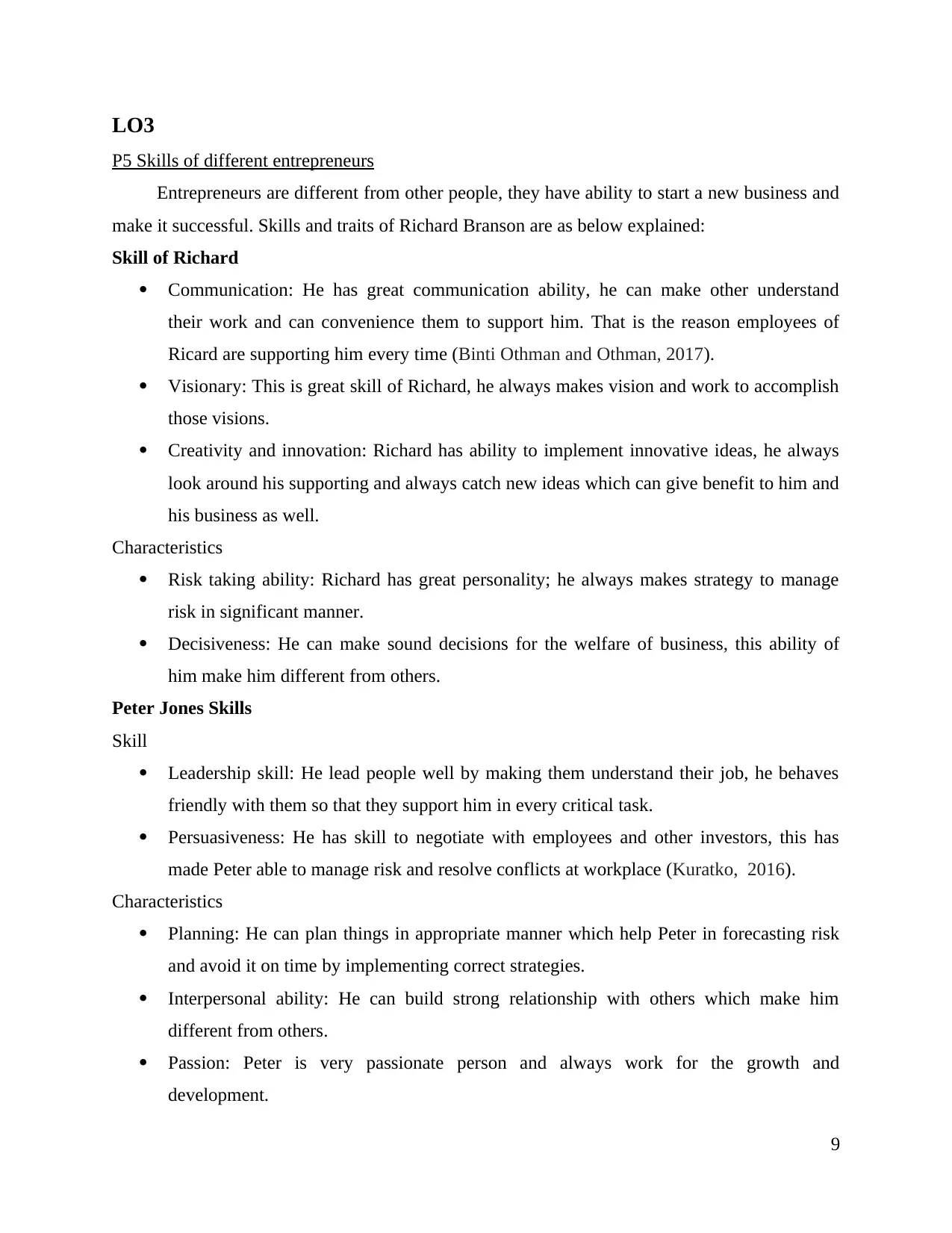
LO3
P5 Skills of different entrepreneurs
Entrepreneurs are different from other people, they have ability to start a new business and
make it successful. Skills and traits of Richard Branson are as below explained:
Skill of Richard
Communication: He has great communication ability, he can make other understand
their work and can convenience them to support him. That is the reason employees of
Ricard are supporting him every time (Binti Othman and Othman, 2017).
Visionary: This is great skill of Richard, he always makes vision and work to accomplish
those visions.
Creativity and innovation: Richard has ability to implement innovative ideas, he always
look around his supporting and always catch new ideas which can give benefit to him and
his business as well.
Characteristics
Risk taking ability: Richard has great personality; he always makes strategy to manage
risk in significant manner.
Decisiveness: He can make sound decisions for the welfare of business, this ability of
him make him different from others.
Peter Jones Skills
Skill
Leadership skill: He lead people well by making them understand their job, he behaves
friendly with them so that they support him in every critical task.
Persuasiveness: He has skill to negotiate with employees and other investors, this has
made Peter able to manage risk and resolve conflicts at workplace (Kuratko, 2016).
Characteristics
Planning: He can plan things in appropriate manner which help Peter in forecasting risk
and avoid it on time by implementing correct strategies.
Interpersonal ability: He can build strong relationship with others which make him
different from others.
Passion: Peter is very passionate person and always work for the growth and
development.
9
P5 Skills of different entrepreneurs
Entrepreneurs are different from other people, they have ability to start a new business and
make it successful. Skills and traits of Richard Branson are as below explained:
Skill of Richard
Communication: He has great communication ability, he can make other understand
their work and can convenience them to support him. That is the reason employees of
Ricard are supporting him every time (Binti Othman and Othman, 2017).
Visionary: This is great skill of Richard, he always makes vision and work to accomplish
those visions.
Creativity and innovation: Richard has ability to implement innovative ideas, he always
look around his supporting and always catch new ideas which can give benefit to him and
his business as well.
Characteristics
Risk taking ability: Richard has great personality; he always makes strategy to manage
risk in significant manner.
Decisiveness: He can make sound decisions for the welfare of business, this ability of
him make him different from others.
Peter Jones Skills
Skill
Leadership skill: He lead people well by making them understand their job, he behaves
friendly with them so that they support him in every critical task.
Persuasiveness: He has skill to negotiate with employees and other investors, this has
made Peter able to manage risk and resolve conflicts at workplace (Kuratko, 2016).
Characteristics
Planning: He can plan things in appropriate manner which help Peter in forecasting risk
and avoid it on time by implementing correct strategies.
Interpersonal ability: He can build strong relationship with others which make him
different from others.
Passion: Peter is very passionate person and always work for the growth and
development.
9
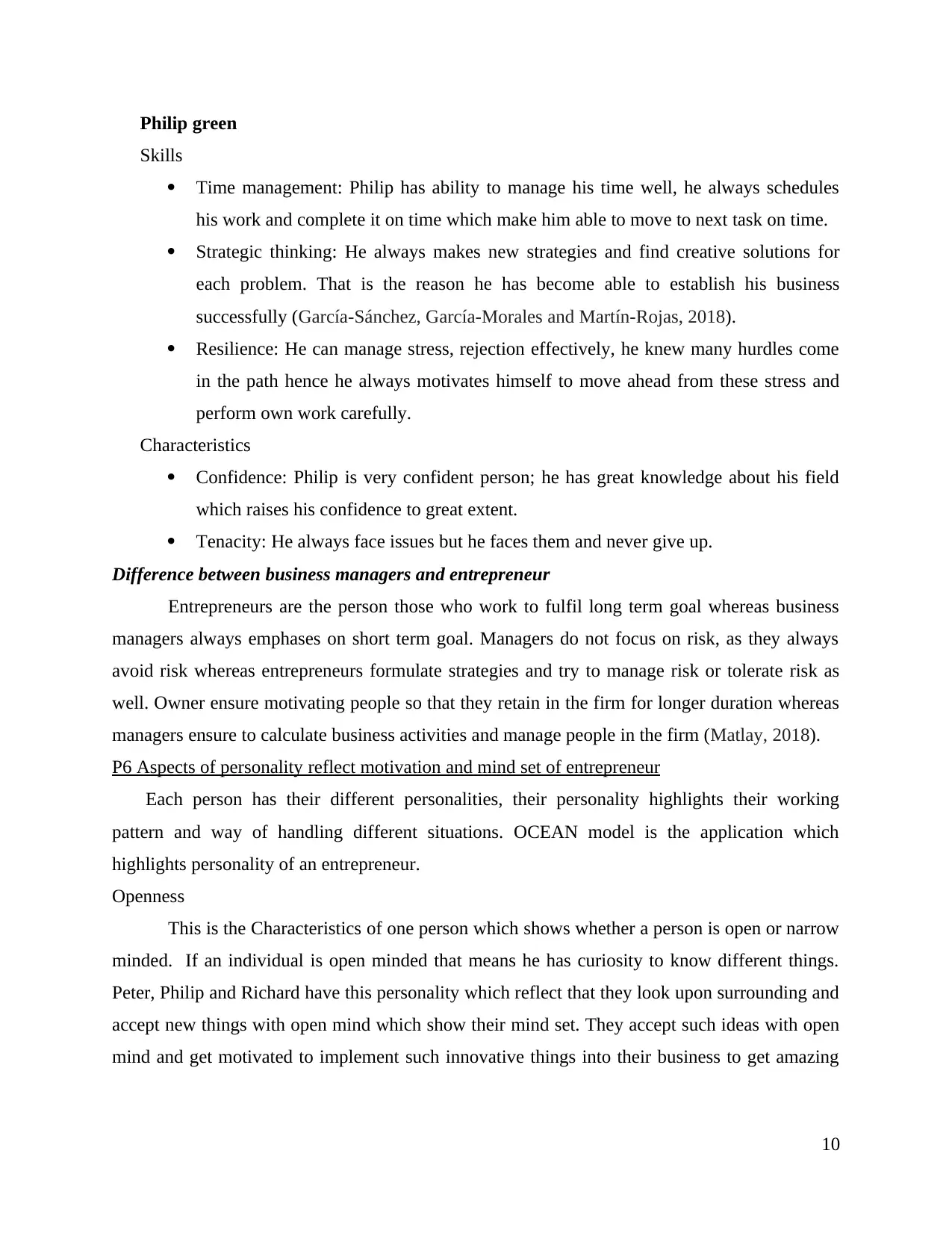
Philip green
Skills
Time management: Philip has ability to manage his time well, he always schedules
his work and complete it on time which make him able to move to next task on time.
Strategic thinking: He always makes new strategies and find creative solutions for
each problem. That is the reason he has become able to establish his business
successfully (García-Sánchez, García-Morales and Martín-Rojas, 2018).
Resilience: He can manage stress, rejection effectively, he knew many hurdles come
in the path hence he always motivates himself to move ahead from these stress and
perform own work carefully.
Characteristics
Confidence: Philip is very confident person; he has great knowledge about his field
which raises his confidence to great extent.
Tenacity: He always face issues but he faces them and never give up.
Difference between business managers and entrepreneur
Entrepreneurs are the person those who work to fulfil long term goal whereas business
managers always emphases on short term goal. Managers do not focus on risk, as they always
avoid risk whereas entrepreneurs formulate strategies and try to manage risk or tolerate risk as
well. Owner ensure motivating people so that they retain in the firm for longer duration whereas
managers ensure to calculate business activities and manage people in the firm (Matlay, 2018).
P6 Aspects of personality reflect motivation and mind set of entrepreneur
Each person has their different personalities, their personality highlights their working
pattern and way of handling different situations. OCEAN model is the application which
highlights personality of an entrepreneur.
Openness
This is the Characteristics of one person which shows whether a person is open or narrow
minded. If an individual is open minded that means he has curiosity to know different things.
Peter, Philip and Richard have this personality which reflect that they look upon surrounding and
accept new things with open mind which show their mind set. They accept such ideas with open
mind and get motivated to implement such innovative things into their business to get amazing
10
Skills
Time management: Philip has ability to manage his time well, he always schedules
his work and complete it on time which make him able to move to next task on time.
Strategic thinking: He always makes new strategies and find creative solutions for
each problem. That is the reason he has become able to establish his business
successfully (García-Sánchez, García-Morales and Martín-Rojas, 2018).
Resilience: He can manage stress, rejection effectively, he knew many hurdles come
in the path hence he always motivates himself to move ahead from these stress and
perform own work carefully.
Characteristics
Confidence: Philip is very confident person; he has great knowledge about his field
which raises his confidence to great extent.
Tenacity: He always face issues but he faces them and never give up.
Difference between business managers and entrepreneur
Entrepreneurs are the person those who work to fulfil long term goal whereas business
managers always emphases on short term goal. Managers do not focus on risk, as they always
avoid risk whereas entrepreneurs formulate strategies and try to manage risk or tolerate risk as
well. Owner ensure motivating people so that they retain in the firm for longer duration whereas
managers ensure to calculate business activities and manage people in the firm (Matlay, 2018).
P6 Aspects of personality reflect motivation and mind set of entrepreneur
Each person has their different personalities, their personality highlights their working
pattern and way of handling different situations. OCEAN model is the application which
highlights personality of an entrepreneur.
Openness
This is the Characteristics of one person which shows whether a person is open or narrow
minded. If an individual is open minded that means he has curiosity to know different things.
Peter, Philip and Richard have this personality which reflect that they look upon surrounding and
accept new things with open mind which show their mind set. They accept such ideas with open
mind and get motivated to implement such innovative things into their business to get amazing
10
⊘ This is a preview!⊘
Do you want full access?
Subscribe today to unlock all pages.

Trusted by 1+ million students worldwide
1 out of 16
Related Documents
Your All-in-One AI-Powered Toolkit for Academic Success.
+13062052269
info@desklib.com
Available 24*7 on WhatsApp / Email
![[object Object]](/_next/static/media/star-bottom.7253800d.svg)
Unlock your academic potential
Copyright © 2020–2025 A2Z Services. All Rights Reserved. Developed and managed by ZUCOL.





